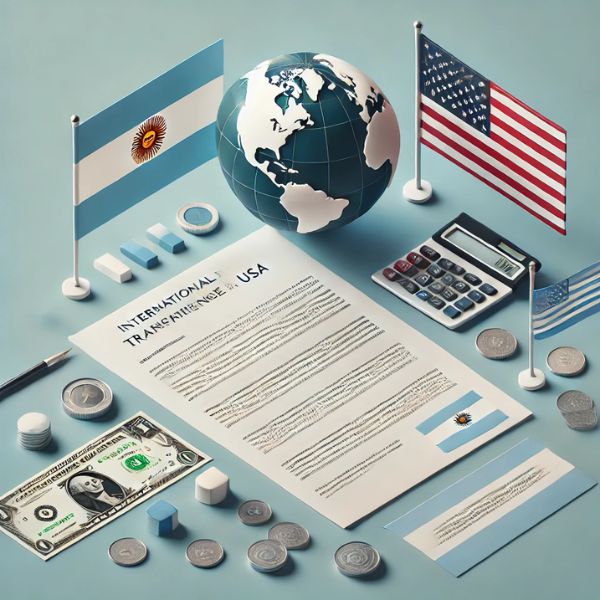a. Why Is This Agreement Important for You, Even If You’re Not Argentine?
Although the title screams “Argentina,” the reality is that what happens here has implications far beyond its borders. The FATCA Argentina-U.S. agreement under FATCA law not only affects Argentinians with U.S. bank accounts or companies, but it’s part of a global trend where governments are tightening control over foreign financial assets. The goal? Zero tax evasion.
If you’re a business owner, investor, or someone who has diversified your wealth outside of your home country, you need to be prepared because what starts with Argentina could quickly extend to other jurisdictions. The rules of the game are changing for everyone! So, if you thought your assets were safe in “Uncle Sam’s house,” you might now have to worry about an unexpected visit from AFIP.
b. The Global Impact of Financial Exchange Agreements
The FATCA agreement is just one of many deals countries like Argentina are signing to ensure that tax authorities worldwide have direct access to detailed information about financial assets. The automatic exchange of information is now the norm among OECD countries and beyond, creating a new landscape where it’s increasingly difficult to “escape” the tax radar.
Whether you live in Europe, Latin America, or Asia, current trends suggest that financial transparency will continue to expand. What was once in the shadows is now illuminated by international regulations like FATCA and CRS, and the message is clear: “If you have assets abroad, you’d better be prepared.”

Indice del artículo
What Is the FATCA Argentina-U.S. Agreement?
a. Origin and Purpose of FATCA
The Foreign Account Tax Compliance Act (FATCA) was enacted in 2010 by the United States with a very clear purpose: to combat tax evasion by U.S. citizens with bank accounts and financial assets abroad. FATCA requires financial institutions worldwide to report detailed information about account holders who are U.S. citizens or tax residents. This way, the U.S. government can track assets that were previously outside its radar.
What’s interesting about the FATCA Argentina-U.S. agreement is that it follows this same principle, but applied in a bilateral context, where both countries commit to automatically exchange information. This means that Argentina can now know precisely what assets its citizens hold in the United States, and vice versa.
b. How Does It Affect Argentinians with Assets in the U.S.?
The FATCA Argentina-U.S. agreement changes the game for any Argentinian with bank accounts or an LLC in the U.S. Previously, it was possible to keep those assets relatively hidden from the control of AFIP (Federal Administration of Public Revenues), but with this agreement, those days are over.
If you’re Argentinian and have an LLC or accounts in the U.S., starting in September 2024, AFIP will have access to that information. This includes details about account holders, income generated, and financial movements. This means that any attempt to evade taxes in Argentina by creating companies or opening accounts abroad is bound to be detected.
c. Details of the Agreement Signed Between Argentina and the United States
The FATCA Argentina-U.S. agreement was signed on December 5, 2022, and establishes an automatic exchange of financial information between both countries. Based on FATCA law, this agreement requires financial institutions in Argentina to report to AFIP the account information of U.S. citizens or tax residents in Argentina, and vice versa.
What’s new about this agreement is that it not only focuses on personal bank accounts but also includes corporate entities such as LLCs. This means that if you have an LLC in the U.S., you will need to provide details about the assets and financial flows linked to that entity. The collaboration between the U.S. and Argentina leaves no room for financial hiding, making this agreement a significant milestone in the fight against tax evasion.
What Information Is Exchanged in the FATCA Argentina-U.S. agreement?
a. Types of Accounts and Entities Affected
The FATCA Argentina-U.S. agreement covers a wide range of financial accounts and entities. The affected accounts are not only personal but also corporate, including structures such as LLCs in the U.S., which, until recently, were considered a safe option for protecting assets from Argentinian tax authorities. However, with this new agreement, those entities are now under the scrutiny of both countries.
Among the main affected accounts are:
- Personal bank accounts: Any Argentinian citizen or tax resident with accounts in the U.S. will be subject to automatic reporting.
- Corporate entities such as LLCs: U.S. financial institutions must report any relevant information about LLCs controlled by Argentinians.
- Investment accounts and trusts: Not only bank accounts but also those related to investments or financial assets will be scrutinized.
b. What Data Will AFIP Receive?
AFIP will receive detailed information about Argentinians with assets in the U.S. This includes a variety of financial data that allows Argentinian tax authorities to track every movement. Here are some of the key data points that will be shared:
- Name and address of the account holder: Complete personal information of account holders, including their tax identification number.
- Account balances: The account balances at the end of the year or before the account was closed will be reported, allowing detailed control over the funds.
- Income generated: Includes information on income earned through investments or assets held in the U.S.
- Financial movements: Details of transactions made, which makes it easier to track the financial activity of Argentinian account holders.
This flow of information has already begun, and starting in September 2024, AFIP will begin receiving the first automatic reports under the FATCA Argentina-U.S. agreement. So, if you thought you could move your money unnoticed, it’s probably time to reconsider that strategy.

Risks and Consequences of Non-Compliance
a. Tax and Criminal Penalties
The FATCA Argentina-U.S. agreement is not just a bureaucratic formality; the consequences of non-compliance can be severe, both in terms of tax and criminal penalties. If you fail to properly report your accounts or financial assets in the U.S., you will be subject to significant penalties in both Argentina and the U.S.
Tax penalties include:
- Economic fines: AFIP can impose fines ranging from a significant percentage of undeclared assets, depending on the amount evaded.
- Interest charges: If the reported information is incorrect or if income is concealed, interest will be applied to unpaid taxes, significantly increasing the total debt.
As for criminal consequences, the situation can be even more concerning. In Argentina, tax evasion offenses can lead to prison sentences, especially if there is proven intent to deliberately hide assets or income. In serious cases, collaboration between AFIP and U.S. authorities could trigger cross-border investigations that affect not only assets in the U.S. but also in any other country involved in information exchange agreements.
b. Recommended Actions to Protect Your Assets
Given the increasing global fiscal transparency, it is essential to act proactively and take steps to protect your assets while staying compliant with international regulations. Here are some key strategies:
- Regularize your tax situation: If you have accounts or an LLC in the U.S., make sure you are up to date with your tax obligations in both the U.S. and Argentina. This includes declaring assets and income accurately and on time.
- Asset restructuring: Consulting with a tax advisor can help you reorganize your assets in a way that optimizes your tax burden within legal limits. Countries with territorial tax regimes may offer you more flexible and legal options to protect your money.
- Use of double taxation agreements: Argentina and the U.S. have double taxation treaties that can prevent you from paying taxes twice on the same income. Consulting how to apply these treaties can reduce your exposure to tax penalties.
- International compliance: Stay updated on international tax compliance regulations, such as FATCA and CRS, which require automatic reporting. Full compliance with these regulations is the best way to avoid penalties.
Future Outlook
a. Potential Changes in International Agreements
The FATCA Argentina-U.S. agreement is just one piece of the global puzzle of tax transparency. Currently, FATCA requires financial institutions to report information on accounts and assets of individuals with U.S. tax ties, but the landscape could change in the coming years. With increasing international pressure to combat tax evasion, it is likely that other countries will seek to expand these bilateral agreements for exchanging financial information.
We have already seen how the OECD has pushed the Common Reporting Standard (CRS), an initiative that takes tax transparency to a global level. While the U.S. is not part of this standard, there could be growing pressure from the international community for the U.S. to align with these global regulations. We may see a convergence between FATCA and CRS, which could result in even stricter agreements and force the U.S. to cooperate more openly with other countries in the fight against tax evasion.
b. Alignment with CRS and Other Global Standards
The CRS (Common Reporting Standard) is already a reality in most OECD member countries, and it works similarly to FATCA, requiring financial institutions to report information on accounts and assets of foreign tax residents. The FATCA Argentina-U.S. agreement follows this approach, but there is a key difference: the U.S. does not automatically exchange information with all countries under CRS.
However, in the future, we may see a convergence between FATCA and CRS as international pressures mount for the U.S. to adopt a more globally aligned approach to transparency standards. This would mean that LLCs in the U.S. and other financial vehicles used by foreigners could be subject to even more rigorous scrutiny.
Additionally, bilateral agreements like the one signed between Argentina and the U.S. could become the norm for other countries also seeking greater control over their citizens’ financial assets abroad.



